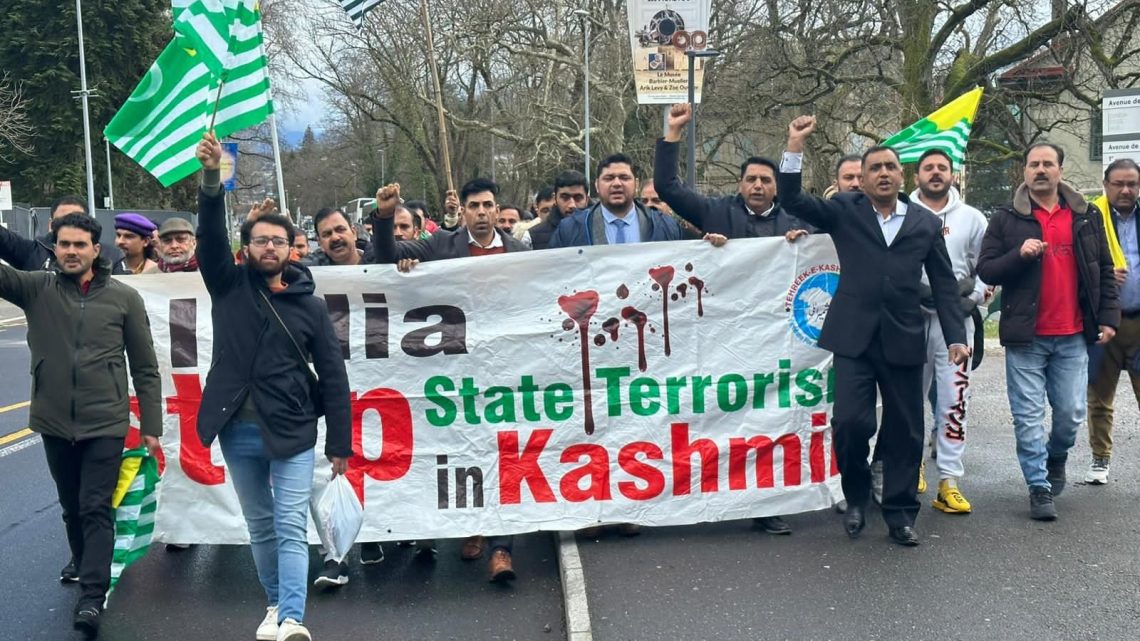
Kashmiri Diaspora Stand against India’s Illegal Occupation
October 28, 2024Once again, the international community was reminded of India’s illegal occupation of Indian Illegally Occupied Jammu and Kashmir (IIOJK) as Kashmiris, Pakistanis, and their allies rallied across the UK to mark Black Day.
These demonstrations serve as a clear reminder of India’s blatant violation of international law, stemming from its military deployment to the UN-designated disputed territory of Jammu and Kashmir on October 27, 1947.
Protests kicked off outside the British Prime Minister’s Office at 10 Downing Street in London before moving to the Indian High Commission. Fahim Kayani, president of Tehreek-e-Kashmir UK and the All Parties International Kashmir Coordination Committee (APIKCC), spearheaded the demonstrations.
“India continues to illegally occupy the UN-designated territory and obstruct the implementation of UN resolutions for a plebiscite,” Kayani asserted. His words underline the continued defiance of international mandates by the Indian government.
During the protests, a petition was submitted to Indian Prime Minister Modi at the High Commission, demanding action towards a UN-mandated plebiscite in Kashmir. The call for justice reverberated through the crowd.
Kayani condemned India’s military presence, declaring, “We reject this illegal occupation and condemn its forces for committing crimes against humanity and war crimes.” His statements resonate with the frustrations of those who have long suffered under oppressive rule.
He further highlighted India’s “full exposure” regarding extraterritorial crimes, stating, “The Indian regime is implicated in murder, organized crime, money laundering, and drug trafficking.” This accusation references recent legal cases against Indian intelligence agents in the US and Canada, emphasizing a pattern of misconduct.
Kayani ominously predicted, “The day is not far when India will face charges of war crimes and genocide in the International Court of Justice.” This assertion signals a growing demand for accountability on the global stage.
Inam ul Haq, APIKCC secretary-general, expressed unwavering solidarity with Kashmiris, labeling their struggle as a legitimate fight for liberation. He condemned India’s oppressive tactics, which impose a “graveyard silence” through arrests and persecution of pro-freedom advocates.
“India must repeal draconian laws like AFSPA and UAPA that violate human rights,” Haq insisted. He emphasized the necessity of trilateral dialogue among the All Parties Hurriyat Conference, Pakistan, and India to address Kashmir’s right to self-determination.
Ghulam Muhammad Safi and Zafar Qureshi, both prominent figures from the All Parties Hurriyat Conference, also addressed demonstrators, highlighting the urgency of their cause.
Tehreek-e-Kashmir organized additional rallies in major European cities like Oslo, Barcelona, and Glasgow. Muhammad Ghalib, president of Tehreek-e-Kashmir Europe, drew attention to issues like fake encounters, arbitrary arrests, and media suppression in Kashmir.
Amidst this turmoil, residents of Indian Illegally Occupied Jammu and Kashmir hold onto hope for improved power supply with the new administration. However, the path to justice and freedom remains fraught with challenges.
The global demonstrations on Black Day underscore a relentless call for justice. The struggle for Kashmir’s rights continues to resonate, highlighting the need for international action against India’s ongoing violations.

